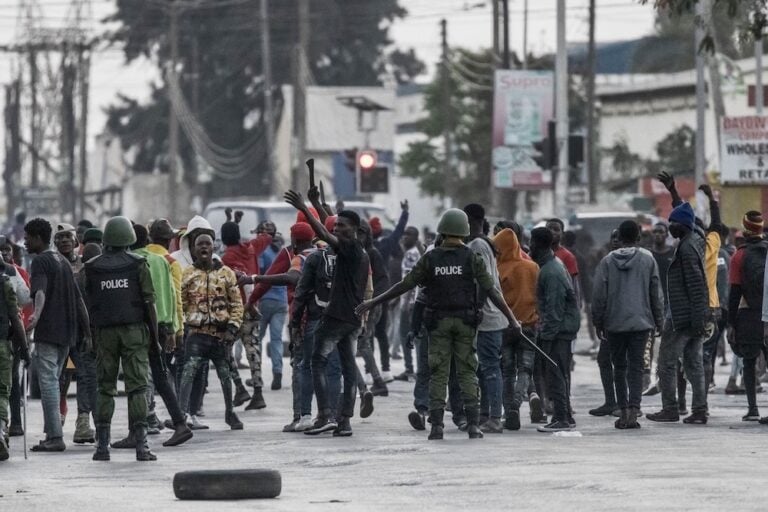Two senior Zambian journalists have been detained two days after the country’s President, Frederick Chiluba, said his government would not interfere with press freedom. Managing director of “The Post” newspaper Fred M’membe and the paper’s editor-in-chief, Masautso Phiri, were arrested on 19 June 1995 in connection with a story the Zambian bi-weekly published stating that […]
Two senior Zambian journalists have been detained two days after
the country’s President, Frederick Chiluba, said his government
would not interfere with press freedom. Managing director of “The
Post” newspaper Fred M’membe and the paper’s editor-in-chief,
Masautso Phiri, were arrested on 19 June 1995 in connection with
a story the Zambian bi-weekly published stating that Chiluba had
a Zairian mistress. Chiluba — a born-again Christian who has
shaped policy around his religious beliefs — has denied knowing
the woman.
In its lead story of Tuesday 13 June headlined “Chiluba’s lover
quizzed”, “The Post” reported claims by Zairian Clementine
Mutshingi Kabondo that she had been Chiluba’s lover since 1983,
and that she had an eight year old daughter by the President.
Kabondo, a cross-border trader, went on to say that she had come
to Zambia in May, and had been detained, interrogated and
tortured by police for two days because it was suspected she had
leaked information to the media.
Responding to the story in a letter published in the 16 June
edition of “The Post”, Chiluba denied all knowledge of Kabondo,
and gave the newspaper 48 hours to substantiate the story by
“producing” Kabondo and her daughter. “Failure of which I will be
left with no alternative but to sue for criminal libel”, said
Chiluba in his letter. “It is obvious that your story is part of
your persistent campaign of vilification intended to malign and
defame me.”
In a reply to Chiluba, published alongside the president’s
response to the story, M’membe refused to produce Kabondo and
said the paper was “ready and willing to receive writs of summons
from your legal representatives.” M’membe also denied “The Post”
was deliberately out to malign and defame Chiluba.
According to eyewitnesses, three senior police officers detained
M’membe shortly after 08:00 on the morning of 19 June, minutes
after M’membe arrived for work at the newspaper’s offices in the
capital, Lusaka. The police were also looking for “The Post”‘s
editor-in-chief, Masautso Phiri, who was not there at the time.
Phiri went on his own accord to the police station an hour or so
later after hearing that M’membe had been detained. According to
staff at “The Post”, both M’membe and Phiri were officially
arrested shortly before 16:00 Zambian time, and have been denied
bail. Police appear to be investigating charges of criminal
libel.
“The Post”‘s Kabondo story — followed on Friday by another lead
story in which a “friend” of Kabondo refuted Chiluba’s denials,
and was quoted as saying the president was “behaving like Judas
Iscariot” — has caused a storm in Zambia. Over the weekend,
supporters of Chiluba’s ruling Movement for Multi-Party Democracy
(MMD) in the populous Copper Belt mining area burnt copies of
“The Post” during demonstrations against the paper. It is also
reported that MMD party officials publicly threatened violence
against anyone found selling “The Post”. Two shareholders in “The
Post”, MMD Finance Secretary Enock Kazindele and government
Finance Minister Ronald Penza, have also called for the closure
of the paper.
Meanwhile, Information Minister Keli Walubita has announced that,
within the next 60 days, he is to table legislation in parliament
establishing a body to regulate the media. In an interview with
Inter Press Service (IPS) last week, Walubita accused the Press
Association of Zambia (PAZA) of failing to reign in the country’s
outspoken independent press. “PAZA is toothless and cannot even
punish journalists who bring the integrity of the profession into
disrepute,” IPS quotes Walubita as saying.
At the close of his state visit to neighbouring Namibia on 17
June, Chiluba said his government would not interfere with press
freedom, but appealed to the media to be responsible, newspapers
in Namibia reported on 19 June. When questioned by journalists
about the Kabondo story, Chiluba — in an apparent reference to
M’membe — questioned the credentials of an editor-in-chief who
“still takes journalism courses” and “talks so loud…and
probably talks in his bed.”
“The press cannot create rules of democracy…that is totally
wrong,” Chiluba is reported by the daily “Windhoek Advertiser” as
saying. “Even if leaders are wrong, it is not African to insult
them in public,” the President continued. Both the “Advertiser”
and another daily, “The Namibian”, quoted Chiluba as saying that
his government would not intimidate the media if the media did
not intimidate the government.
Recommended Action
Send appeals to Zambian authorities:
criminalization of defamation, on the grounds that libel should
be an issue contested in the civil courts (Note that Criminal
Libel was one of the laws Zambia’s independent media law reform
commission singled out for amendment; the government is yet to
respond to the commission’s report, which was presented to the
government in October 1993)
Appeals To
His Excellency President Frederick Chiluba
President of the Republic of Zambia
State House
Independence Avenue
Lusaka, Zambia
Fax: +260 1 221939
Tel: +260 1 264106
Please copy appeals to the originator if possible.


